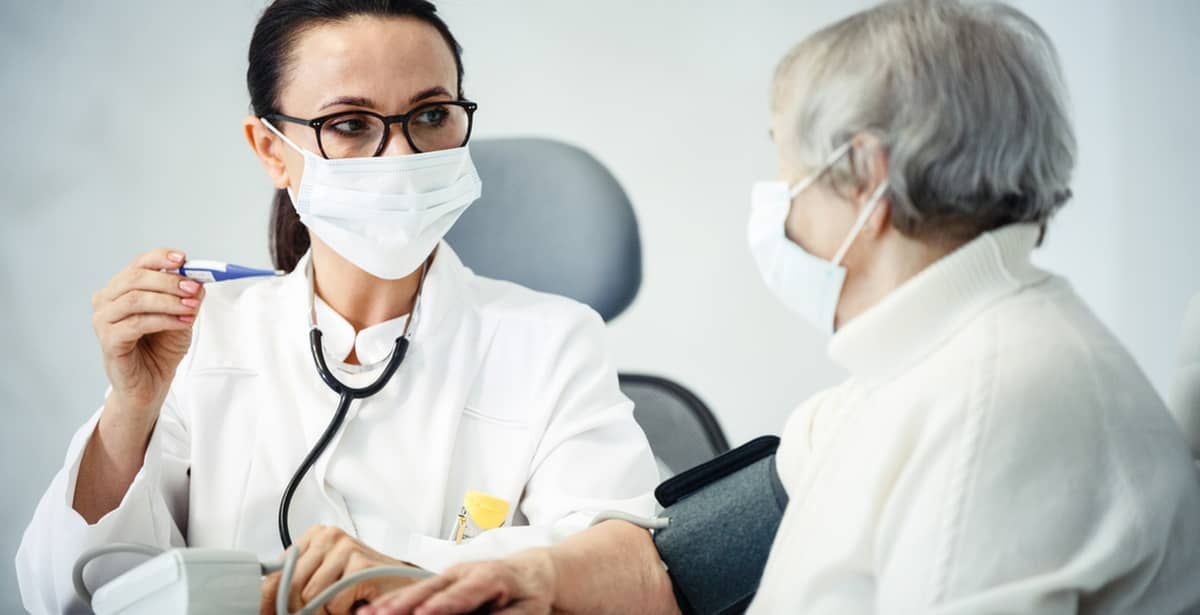The FNP Role in Patient Education
by Carson-Newman … on April 18, 2021
Learn more about Carson-Newman's online BSN to MSN-FNP program.
As primary care providers, family nurse practitioners (FNPs) place great value in providing patient education as part of their holistic medical care. FNPs honor the adage "knowledge is power" as they deliver patient-centered care to promote health and wellness.
In this article, we'll discuss the following points related to patient education:
- What is the role of the FNP?
- What is holistic healthcare?
- What is patient education?
- Why is patient education important?
- The role of patient education in combating misinformation
What is the Role of the Family Nurse Practitioner?
FNPs provide care for patients across the lifespan, including infants, adolescents, adults and seniors, treating various medical needs. Many FNPs focus on disease prevention to promote long-term health.
A family nurse practitioner may:
- Perform physical examinations
- Treat primary care illnesses, injuries, and conditions
- Prescribe medications
- Manage patient records
- Recommend, conduct, and interpret diagnostic tests
- Educate individuals or communities in health topics relevant to them
- Counsel patients
Since FNPs care for patients across the lifespan, they often develop long-term relationships with their patients. FNPs get to know a patient's lifestyle, concerns and potential for healthy changes. The FNP's holistic approach includes diagnosis, treatment and patient education.
What is Holistic Nursing?
Holistic care is a comprehensive form of health care. The origins of holistic nursing date back to Florence Nightingale, who considered the whole patient in health care delivery. Both internal and external influences are factored into holistic care, including the body, mind (cognition), emotions, spiritual well-being, relationships and environment.
Holistic care also takes social determinants into consideration. Per the Office of Disease Prevention and Health Promotion's website, social determinants include:
- Availability of resources to meet daily needs, such as educational and job opportunities, living wages, or healthful foods
- Social norms and attitudes, such as discrimination
- Exposure to crime, violence, and social disorder, such as the presence of trash
- Social support and social interactions
- Exposure to mass media and emerging technologies, such as the Internet or cell phones
- Socioeconomic conditions, such as concentrated poverty
- Quality schools
- Transportation options
- Public safety
- Residential segregation
Since FNPs treat across the lifespan, they have a profound ability to influence patients toward greater long-term health benefits. A holistic approach to nursing allows FNPs to consider the context surrounding initial symptoms, such as lifestyle choices, which are addressed in a comprehensive treatment plan.
Holistic care goes hand-in-hand with patient education as both emphasize collaboration, attention and compassion. These attributes foster emotional well-being and empowerment, working to ensure care is closer to patient needs.
Read our blog to learn more about holistic health care.
What is Patient Education?
Patient education can be defined as "the process of influencing patient behavior and producing the changes in knowledge, attitudes and skills necessary to maintain or improve health."
Many FNPs utilize patient education while they work to deliver holistic care. The culture of primary health care is shifting from a model that initially prioritized seeing a high number of patients each hour to one that is built upon patient satisfaction and outcomes.
Nurse practitioners are equipped to succeed within such a model of care due to their collaborative approach and emphasis on patient education.
As Teresa (Tess) Judge-Ellis, DNP, FNP-BC, and Thad R. Wilson, PhD, FNP-BC noted, the "observable actions of the NP-patient encounter" are "health education and counseling."
Taking their time during appointments, ensuring patients understand information, and advising patients toward better health in comprehensive ways are cornerstones of the nurse practitioner's practice.
Rather than focusing only on patients-per-hour, "[Nurse Practitioners] practice nursing, which is more than identifying a problem and suggesting a solution; it is a quest to work collaboratively with patients, families and others toward patient-centered goals," as stated by Teresa (Tess) Judge-Ellis, DNP, FNP-BC, and Thad R. Wilson, PhD, FNP-BC.
FNPs take their time to educate patients in a number of key areas that promote optimal health. Through developing relationships and an individualized understanding of fundamental needs, FNPs provide patient education in areas, such as:
- Wellness and disease prevention
- Disease process
- Monitoring for symptoms
- At-home treatment
- Immunizations
- Growth progress for children and adolescents
- The role of medicines and vitamins
- The significance behind exams and physiology
- And more
Dr. Kimberly Bolton, Director of Carson-Newman's online FNP programs sheds additional light on the value of patient education: "If we truly want to make an impact on disease processes, then we have to start education for prevention and maintenance every time."
Read more from Dr. Bolton in our faculty interview blog.

What Are the Components of Patient Education?
Patient education takes the needs of the patient into consideration. It encompasses understanding, compassion and individually tailored care. Patient education furthers the efficiency of treatment—and there is no one-size-fits-all approach.
How is patient education most effective? One way to maximize its impact is reinforcement through various forms of communication.
A recent study involving the parents of children being discharged from a hospital notes when written and verbal health information was both provided, it improved "knowledge and satisfaction [more so] than providing verbal information only."
As educators, it is also helpful for FNPs to remember different types of learning styles among individuals. The learning styles are:
- Visual
- Auditory
- Read & Write
- Kinesthetic
There are several ways to administer patient education including:
- One-on-one conversation
- Written materials
- Group Classes
- Videos
- Online content
One-on-One Conversation
Verbal conversation is one of the simplest and most effective ways to provide patient education. A one-on-one conversation between the patient and provider may calm those who feel afraid or overwhelmed.
Conversations pave the way for FNPs to offer empathy, which allows for rapport building, gaining patients' trust and more meaningful discussions. FNPs can assess how the patient is feeling, answer any questions and make sure the patient is in agreement with the care plan.
Written Materials
Written materials let patients digest information at their own pace in a quiet, uninterrupted space. Patients can also keep written materials on hand for future reference. While written materials may work especially well for visual learners, they may be less effective for patients with language barriers or low literacy, who may benefit from video or online content.
According to the Office of Disease Prevention and Health Promotion, low health literacy, and low general literacy, disproportionately, negatively affect racial and ethnic minority groups as well as older adults.
Videos
As a form of patient education, videos are often used to promote general health practices such as proper hand-washing, essential nutrition, or how to administer an injectable medication. Videos can also serve specific groups with tailored messages, like "Diabetes 101" to help individuals learn how to cope with newfound conditions.
Subtitles may boost the effectiveness of videos for "persons watching videos in their non-native language, children and adults learning to read, and persons who are D/deaf or hard of hearing," according to Morton Ann Gernsbacher in the article "Video Captions Benefit Everyone."
Online Content
Online content ranges from websites and email campaigns to social media. Social media can quickly spread awareness on specific topics. Google reports that it receives over one billion health questions every day, so offering user-friendly, scientifically supported health information via a website is a powerful way to educate people with health concerns.
Practitioners can also use email campaigns to target specific groups they wish to reach and should be able to provide patients with reputable online references. Providers can use online patient portals to deliver information and content to patients.
Classes
Classes can be effective for sharing information that benefits a targeted community—like nutritional education or infant care for new parents. Classes may be conducted in-person or remotely and may be a part of a patient's comprehensive treatment plan.
Why is Patient Education Important?
An FNP's focus on patient education, health promotion and disease prevention sets them apart from other health care providers. In fact, according to data published by Merck Manual, 88% of nurse practitioners spend at least half of their appointment times educating patients.
As one of the core FNP responsibilities, patient education has been identified by a study in Nursing Research as an important factor leading to higher satisfaction and compliance rates among patients.
One study following surgery patients reported that those who participated in scripted patient education phone calls had "significantly shorter mean length[s] of stay when compared to patients that [received] usual care."
Another study followed patients suffering from chronic heart failure. Those who received a one-hour teaching session prior to hospital discharge experienced improved outcomes, including better self-care and lower health care costs.
Tailored patient education shows benefits as well. In a recent clinical trial, patients diagnosed with rheumatoid arthritis articulated their educational needs to providers. This needs-driven approach to patient education helped patients improve their self-efficacy, management of symptoms and health status.
Patient education demonstrates both short-term and long-term individual gains. It also benefits families and communities, as members experience improved health and spread information on wellness.
As FNPs consider factors such as patient health literacy, personal attitudes and beliefs, the public health impact of patient education becomes greater.
The Role of Patient Education in Combating Misinformation
With the increasing spread of "fake news" and viral reach of inaccurate medical information through social media and the internet, FNPs have an important role in disseminating correct information to the patient population.
When combating misinformation, a relationship of trust between patient and practitioner is key in patient education. A recent article suggests that relational trust often outweighs objective facts when it comes to what people choose to believe. "People are more likely to trust a friend or family member who shares something on Facebook than a stranger," even if that stranger is a medical professional.
The FNP who wins the trust of the patient through honest, informative communication that is grounded in facts, research and science can provide holistic patient education. The resulting rapport will stay with the patient, as will the medical advice received within the context of a trusting relationship, which will lead to better health outcomes.
Unfortunately, misinformation is a common issue. One study found that 30% of gynecologic cancer-related tweets contained inaccurate information, some of which had a farther reach than posts with accurate prevention methods.
Nurse practitioners can use specific patient education techniques to aid in combating misinformation. For example, in the Teach-Back Method reported by the National Library of Medicine, health care providers ask patients to repeat instructions. Providers then have the opportunity to correct muddled or incorrect information.
FNPs can also provide patients with resources that fit their level of health literacy. These resources can help patients fact-check other websites or materials they read.
Battling misinformation does not only stand to improve the physical health of patients. It can also empower them, improving mental health and decreasing experiences of anxiety or fear.

Become a Leader in Patient Education
Carson-Newman University offers working nurses the flexibility to grow professionally within a supportive, faith-based community. For nurses with a BSN, consider our online MSN-FNP degree program, while MSN degree holders can explore our online Post-Master's FNP Certificate program.
Save time and energy as we handle clinical placement for you during all of your clinical courses. Be in control of your schedule as you continue working as a nurse with no mandatory log-in times. Through Carson-Newman, you can lead the way in patient education as a family nurse practitioner.
Read our blog to learn why Carson-Newman ranks among top online nursing programs.
Learn more about Carson-Newman's online MSN-FNP or online PMC-FNP.
